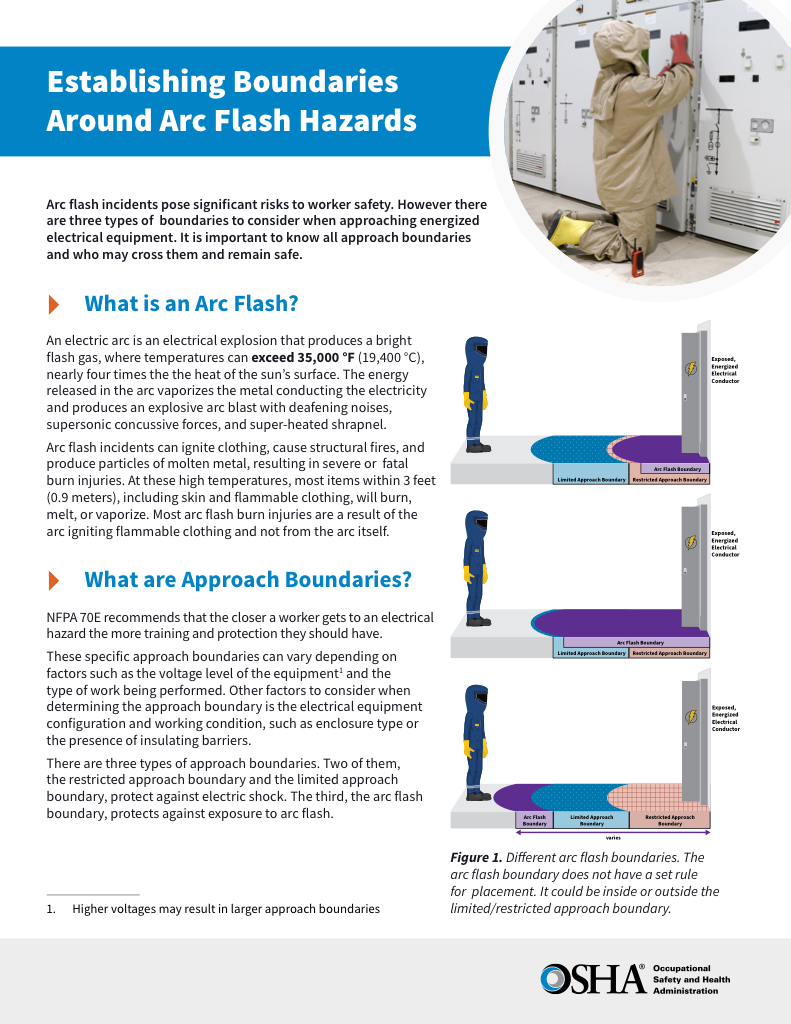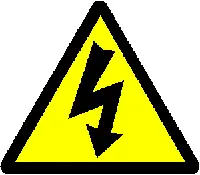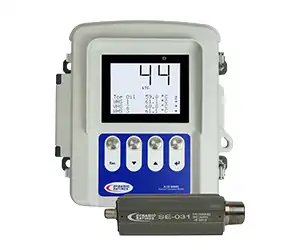Solid State Relays - SSR Switching
By William Conklin, Associate Editor
Substation Relay Protection Training
Our customized live online or in‑person group training can be delivered to your staff at your location.

- Live Online
- 12 hours Instructor-led
- Group Training Available
Download Our OSHA 4474 Fact Sheet – Establishing Boundaries Around Arc Flash Hazards

- Understand the difference between arc flash and electric shock boundaries
- Learn who may cross each boundary and under what conditions
- Apply voltage-based rules for safer approach distances
Solid state relays (SSRs) provide fast, silent switching for AC or DC voltage loads using optical coupling and electrically isolated input circuits. Ideal for automation, motor control, and power supply systems, SSRs offer high reliability, energy efficiency, and long lifespan.
What are Solid State Relays?
Solid state relays utilize semiconductor components to switch electrical loads without mechanical parts, providing faster and more reliable performance than mechanical relays. They:
✅ Deliver silent, high-speed switching with no mechanical wear
✅ They are ideal for industrial automation, HVAC, and control systems
✅ Enhance reliability and lifespan in demanding applications
Basic Protection Relay Training
Request a Free Training Quotation
Solid state relays (SSR) can switch both AC or DC voltage using a low-power control signal that is completely electrically isolated from the load. The relay’s input circuits accept a specific input voltage from the power supply, which activates the switching mechanism. Through optical coupling, the SSR transfers the control signal without any physical contact, ensuring fast, silent, and reliable operation. This design makes SSRs ideal for sensitive electronics where isolation and precision are critical.
When selecting a solid state relay (SSR), it’s essential to match the input voltage and type of control signal—whether for AC or DC voltage—to the specific application. The SSR’s input circuits utilize optical coupling to maintain the control side's electrical isolation from the load side, thereby preventing interference and enhancing safety. A stable power supply ensures consistent performance, while this contactless design reduces wear and improves reliability in high-speed switching environments.
How Solid State Relays Work Compared to Electromechanical Relays
In the realm of electronics, controlling the flow of current is crucial. Traditionally, electromechanical relays (EMRs) have been the workhorses for this task. However, the rise of solid state relays has presented a compelling alternative, offering significant advantages for modern applications.
Electricity Today T&D Magazine Subscribe for FREE

- Timely insights from industry experts
- Practical solutions T&D engineers
- Free access to every issue
Applications of Solid State Relays
| Application Area | Example Uses | Why SSRs Are Preferred | Key Benefit |
|---|---|---|---|
| Industrial Automation | Conveyor systems, robotic arms | High-speed switching and long-term reliability | Minimal downtime in production lines |
| HVAC Systems | Heating elements, fan control | Silent and efficient operation | Energy savings and low noise |
| Motor Control | Motor speed regulation, pumps | Handles high-frequency switching (PWM) | Precise and stable motor performance |
| Medical Equipment | Imaging machines, surgical tools | Silent, surge-protected switching | Patient-friendly quiet operation |
| Audio/Recording Studios | Mixing boards, amplifiers | Noise-free switching | Preserves clean audio signals |
| LED Lighting Systems | Dimming controls, stage lighting | Fast switching for smooth dimming | Flicker-free, precise brightness control |
| Outdoor/Harsh Environments | Irrigation, chemical processing | Encapsulated design resists moisture/dust | Reliable operation in extreme conditions |
This article delves into seven key reasons why SSRs are increasingly becoming the preferred choice for various electronic systems:
High-Speed Switching and Precision Control in Modern Electronics
EMRs rely on the physical movement of contacts to switch current flow. This inherently limits their switching speed. In contrast, SSRs utilize semiconductors, allowing them to operate at extremely high speeds. Switching times for SSRs can be in the microsecond range, compared to milliseconds for EMRs. This translates to superior performance in applications requiring high-frequency control, such as:
-
-
Pulse Width Modulation (PWM): A technique for controlling power delivery by rapidly switching a circuit on and off. SSRs excel in PWM applications due to their fast switching speeds, which enable precise regulation of power output in devices such as motor controllers and LED dimmers.
-
Data Acquisition Systems: These systems involve the rapid conversion of analog signals into digital data. The high switching speed of SSRs ensures accurate signal capture and minimizes data loss during the conversion process.
-
For a detailed technical breakdown, see our guide on how a solid state relay works.
Key Applications of Solid State Relays in Industry and Technology
| Feature | Solid State Relays (SSRs) | Electromechanical Relays (EMRs) | Key Advantage of SSRs |
|---|---|---|---|
| Switching Speed | Microseconds (ideal for PWM and data systems) | Milliseconds (slower, mechanical action) | Precise high-frequency control |
| Lifespan & Reliability | Very long (no moving parts, no wear) | Limited (contact wear, arcing over time) | Minimal downtime, extended service life |
| Noise Level | Completely silent (no moving contacts) | Audible clicking during operation | Ideal for noise-sensitive environments |
| Energy Efficiency | Lower energy loss, high efficiency | Higher energy loss due to mechanical parts | Reduces costs and environmental impact |
| Environmental Resistance | Sealed design resists dust, moisture, and heat | Vulnerable to contaminants and temperature | Reliable in harsh or outdoor environments |
| Maintenance | Minimal (no contact cleaning or replacement) | Requires regular maintenance | Lowers maintenance costs |
| Signal Isolation | Built-in isolation for surge and noise protection | Limited isolation capabilities | Protects sensitive electronics |
Long-Term Reliability and Extended Lifespan of SSRs
The Achilles' heel of EMRs lies in their mechanical components. These parts are prone to wear and tear over time, leading to eventual failure. Solid state relays, devoid of moving parts, boast a significantly longer lifespan. Their solid-state design eliminates concerns about contact bounce, arcing, and mechanical fatigue, resulting in highly reliable operation for years to come. This enhanced reliability is critical in applications like:
-
-
Industrial Automation: Manufacturing processes often rely on the consistent and dependable operation of control systems. Solid state relays ensure long-term performance, minimizing downtime and production delays caused by relay failures, much like the benefits provided by advanced complex protective relays.
-
Safety-Critical Systems: In applications where equipment failure can have severe consequences, such as medical devices or emergency lighting systems, the unwavering reliability of SSRs becomes paramount—an essential feature of any robust protective relay strategy.
-
Silent Operation for Noise-Sensitive Environments
The clicking and clattering of EMRs can be a significant nuisance, particularly in noise-sensitive environments. Solid state relays operate in blissful silence due to the absence of moving parts. This silent operation makes them ideal for applications where noise control is a priority, such as:
-
-
Medical Facilities: Hospitals and clinics require a serene environment for both patients and medical personnel. SSRs contribute to a peaceful atmosphere by eliminating unwanted noise during equipment operation.
-
Audio Recording Studios: For musicians and audio engineers, capturing pristine sound recordings is paramount. The silent operation of SSRs ensures that no relay noise contaminates the delicate audio signals.
-
Energy Efficiency and Reduced Power Losses
Every watt saved translates to lower energy costs and a reduced environmental footprint. Solid state relays are inherently more efficient than EMRs. Their design minimizes energy losses during switching, leading to lower power consumption. This translates to:
-
-
Reduced Operating Costs: Businesses and individuals can benefit from lower electricity bills due to the energy-saving nature of SSRs.
-
Environmentally Friendly Operation: By consuming less power, SSRs contribute to a greener future by minimizing greenhouse gas emissions associated with electricity generation.
-
Environmental Durability and Robust Design
Dust, moisture, and extreme temperatures can significantly impact the performance of EMRs. SSRs, on the other hand, are encapsulated units that shield them from these environmental contaminants. This robust construction makes them well-suited for applications in harsh environments, such as:
-
-
Chemical Processing Plants: These facilities often involve exposure to corrosive chemicals and dust particles. The sealed construction of solid state relays protects them from these contaminants, ensuring reliable operation.
-
Outdoor Applications: Whether it's controlling lighting systems or operating irrigation equipment, SSRs can withstand the challenges of outdoor environments, including rain, snow, and extreme temperatures.
-
Test Your Knowledge About Electrical Protection!
Think you know Electrical Protection? Take our quick, interactive quiz and test your knowledge in minutes.
- Instantly see your results and score
- Identify strengths and areas for improvement
- Challenge yourself on real-world electrical topics
Low Maintenance Requirements and Cost Savings
The lack of moving parts in solid state relays eliminates the need for routine maintenance tasks, such as contact cleaning or replacement, which are essential for EMRs. This translates to:
-
-
Reduced Downtime: Since maintenance requirements are minimal, SSRs contribute to increased system uptime, minimizing production delays or disruptions in critical operations.
-
Lower Maintenance Costs: Eliminating routine maintenance tasks yields significant cost savings throughout the equipment's lifespan.
-
Signal Isolation and Surge Protection for Sensitive Equipment
Certain solid state relays offer built-in isolation between the control input and the output circuit. This isolation provides a crucial layer of protection for sensitive equipment in several ways:
-
Surge Protection: Electrical spikes and transient currents can damage delicate electronic components. The isolation barrier in SSRs helps to mitigate these surges, safeguarding connected equipment with built-in electrical surge protection.
-
Reduced Electrical Noise: Ground loops and other sources can introduce unwanted electrical noise into a system, compromising its performance. Signal isolation in SSRs helps to minimize this noise, ensuring clean and reliable signal transmission.
-
Improved System Stability: The isolation barrier helps prevent electrical interference between the control circuit and the load circuit, thereby contributing to overall system stability and enhanced performance.
Why Solid State Relays Are Replacing Mechanical Relays
Solid state relays offer a compelling alternative to electromechanical relays for a wide range of applications. Their superior speed, reliability, silent operation, efficiency, environmental resistance, and reduced maintenance requirements make them a powerful and versatile choice for modern electronic systems. Whether it's ensuring precise control in industrial automation or maintaining a peaceful environment in a medical facility, SSRs provide a reliable and efficient solution for the ever-evolving needs of the electronics industry.
Related Articles








